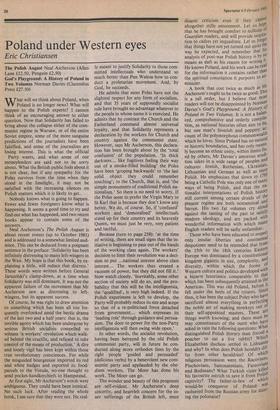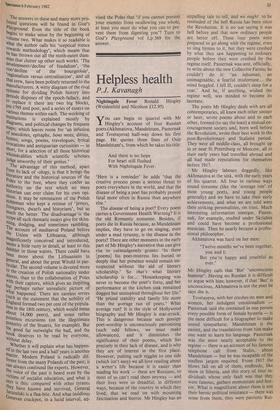Poland under Western eyes
Eric Christiansen
what will we think about Poland, when Poland is no longer news? What will happen to the Polish experts? I cannot think of an encouraging answer to either question. Now that Solidarity has failed to bring about the collapse either of the com- munist regime in Warsaw, or of the entire Soviet empire, some of the more sanguine predictions of the journalists have been falsified, and some of the journalists are losing interest. This is what the official
Party wants, and what some of our moneylenders are said not to be sorry about. What the British public feels about it is not clear, but if any sympathy for the Poles survives from the time when they stood in the limelight, it may not be satisfied with the increasing silences on Polish matters which it is likely to get.
Nobody knows what is going to happen. Fewer and fewer foreigners know what is happening. It seems a good time to try and find out what has happened, and two recent books appear to contain some of the answers.
Neal Ascherson's The Polish August is about recent events (up to October 1981) and is addressed to a somewhat limited aud- ience. This can be deduced from a poignant sentence in the preface: 'Solidarity has been infinitely distressing to many left-wingers in the West. My hope is that this book, by ex- plaining a little, will reduce that distress.' These words were written before General Jaruzelski's clamp-down, at a time when Solidarity was still dominant. It was not the apparent failure of the movement that Mr Ascherson saw as distressing to left- wingers, but its apparent success.
Of course, he was right to draw attention to something which has been all too fre- quently overlooked amid the hectic drama of the last two and a half years: that is, the terrible agony which has been undergone by serious British socialists compelled to witness 'a workers' revolution which walk- ed behind the crucifix, and refused to take control of the means of production.' A dire and lonely vigil has been kept within those true revolutionary consciences. For while the misguided bourgeoisie imported its red and white badges and exported its food- parcels to the Vistula, no-one thought to send pocket-handkerchiefs to Hampstead.
At first sight, Mr Ascherson's words were ambiguous. They could have been ironical. No such luck. After reading the whole book, I am sure that they were not. He real-
ly meant to justify Solidarity to those com- mitted intellectuals who understand so much better than Pan Walesa how to con- duct a proletarian movement. And, by God, he succeeds.
He admits that most Poles have not the slightest respect for any form of socialism, and that 35 years of supposedly socialist rule have brought no advantage whatever to the people in whose name it is exercised. He admits that by contrast the Church and the Fatherland command almost universal loyalty, and that Solidarity represents a declaration by the workers for Church and country against the communist state. However, says Mr Ascherson, this declara- tion has been brought about by the 'total confusion' of the population. 'In thick darkness... like fugitives feeling their way out of a smoke-filled building' the Poles have been 'groping backwards' to 'the last solid object they could remember touching'; to the Church, that is, and 'the simple monuments of traditional Polish na- tionalism.' So there is no need to worry. If the Poles seem to prefer the Virgin Mary to St Karl that is because they don't know any better. We do, of course. So, if 'confused' workers and 'demoralised' intellectuals stand up for their country and its heavenly Queen, we must just be very, very patient and tactful.
Because (turn to page 258): 'at the time of writing, there are small signs that the in- itiative is beginning to pass out of the hands of the working class again. The workers' decision to limit their revolution was a deci- sion to put ...national interest above class interest... The workers thus created a vacuum of power, but they did not fill it.' Now watch closely. 'Inevitably, some other section of society will do so, and the pro- bability that this will be the intelligentsia, the 'qualified', is very high indeed. If the Polish experiment is left to develop, the Party will probably reduce its size and scope to that of a re-politicised force detached from government... which expresses its `leading role' through guidance and persua- sion. The door to power for the non-Party intelligentsia will then swing wide open.'
In other words, the socialist revolution, having been betrayed by the old Polish communist party, will in future be con- ducted along more orthodox lines by the right people 'guided and persuaded' (delicious verbs) by a benevolent new com- munist party and applauded by the obe- dient workers. The Moor has done his work. The Moor can go.
The wonder and beauty of this prognosis are self-evident. Mr Ascherson's deep sincerity, and heartfelt concern for the in- ner sufferings of the British left, must
disarm criticism even if they cannot altogether stifle amusement. Let us hope that he has brought comfort to millions Guardian readers, and will provide inspira- tion to cadres yet inquadrate. Let us forget that things have not yet turned out quite the way he expected, and remember that his analysis of post-war Polish history is by 11c) i means as daft as his reason for writing it. He knows Poland, and his work can be read for the information it contains rather than the spiritual consolation it purports to ad- minister. A book that cost twice as much as Mr Ascherson's ought to be twice as good. This is a tall order, but I believe that Most readers will not be disappointed by Norman, Davies's God's Playground: A History Poland in Two Volumes. It is not a balan- ced, comprehensive and orderly comnila tion, as national histories often aim to be, but one man's feverish and peppery ac- count of the polymorphous commonwealth which he loves. Since Poland has no natural or historic boundaries, and has only recent- ly become an ethnic unity, within limits DX' ed by others, Mr Davies's amorous erudi- tion takes in a wide range of peoples and cultures: Jewish, Ruthenian, Ukrainian. Lithuanian and German as well as Mere. Polish. He emphasises that down to 179' being a Catholic Pole was only one of mart) ways of being Polish, and that the na- tionalist interpretations of Polish history still current among certain druids of the present regime are both nonsensical and, barren. His two fat volumes cry aloud against the taming of the past to satisfy modern ideology, and are packed with wonderful information with which many English readers will be sadly unfamiliar. Those who have been educated to respect only insular liberties and continental despotisms need to be reminded that from the 15th to the 18th centuries Eastern Europe was dominated by a constitutional kingdom gigantic in size, complexity, and diversity, within which the forms of Western culture and politics developed With a bizarre luxuriance comparable to that which has been subsequently attained in the i Americas. This was old Poland, before t fell under the heels of the tyrants. Since then, it has been the subject Poles who have sacrificed almost everything in perfecting the noble art of making monkeys out of their self-appointed masters. These are things worth knowing; and there must be may connoisseurs of the outré who have asked in vain the following questions: What distinguished Polish literary man forced a poacher to eat a live rabbit? Which Elizabethan duchess settled in Lithuania and why? In what does Polish heraldrY dif- fer from other heraldries? Of which religious persuasion were the Racovians, Pinchovians, Samosatenians, Farnovialls, and Budneans? What Turkish vizier killed his favourite ostrich to save it from Polish captivity? The father-in-law of wine" would-be conqueror of Poland Was cashiered from the Russian army for danc- ing the polonaise? The answers to these and many more pro- found questions will be found in God's Playground. Even the title of the book begins to make sense by the beginning of volume two. What makes it so readable is what the author calls his 'sceptical stance towards methodology', which means that he has thrown out all the moth-eaten dum- mies that clutter up other such works. 'The development/decline of feudalism', 'the rise/decline of the bourgeoisie', regionalism versus centralisation', and all that crew, have been politely returned to the Manufacturers. A witty diagram of the rival sYsterns for dividing Polish history into Periods disposes of the epoch-fallacy, and to replace it there are two big blocks, Pre-1795 and post, and a series of essays on various themes within each. The working of institutions is explained mostly by diagrams, and political changes by frequent maps; which leaves room for 'an infusion of anecdotes, epitaphs, bons mots, ditties, hymns, songs, poems, travelogues, lyrical evocations and antiquarian curiosities — in whrt, for a selection of all those historical Whmsicalities which scientific scholars Judge unworthy of their genius.' r The advantage of this method, apart from its lack of -ology, is that it brings the literature and the historical sources of the Poles to the fore, where they confer an authority on the text which no mere historian can ever claim for his own opi- nions. It may be reminiscent of the Polish nobleman who kept a retinue of 'jesters, foreigners, dwarfs and historians', but so much the better. The disadvantage is the scope all such thematic essays give for skim- Ting, dodging, and sometimes rambling. The account of mediaeval Poland before the Union with Lithuania, although Magnificently conceived and introduced, seems a little rusty in detail, at least to this dabbler in those waters. There could have been more about the Lithuanians in general, and about the great Witold in par- ticular. The second volume is devoted more to the creation of Polish nationality under duress, than to the collaboration of Poles L'Alth their captors, which gives an inspiring °tit Perhaps rather unrealistic picture of ,what happened. There are careless errors lsuch as the statement that the nobility of England formed two per cent of the popula- tion in the 18th century, which would mean about 14,000 peers), and some rather Pointless excursions (on the illegitimate Posterity of the Stuarts, for example). But the good far outweighs the bad, and the book deserves to be read by everyone, Without delay. Whether it will explain what has happen- ed in the last two and a half years is another Matter. Modern Poland is radically dif- ferent from the many Polands of the past; it t he always confound the experts. However, `1e voice of the past is heard even by the victims of socialist education, and what it Says is this: compared with other tyrants they have known and survived, General J▪ aruzelski is a flea-bite. And what insidious Genevan crackpot, in a lucid interval, ad- vised the Poles that 'if you cannot prevent your enemies from swallowing you whole, at least you must do what you can to pre- vent them from digesting you'? Turn to God's Playground vol I,p.369 for the answer.

























 Previous page
Previous page